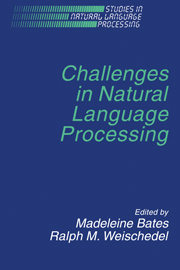Book contents
- Frontmatter
- Contents
- Preface
- Symposium participants
- Part I Challenging problems
- Part II Building a lexicon
- Part III Semantics and knowledge representation
- 5 Events, situations, and adverbs
- 6 Natural language, knowledge representation, and logical form
- Part IV Discourse
- Part V Spoken language systems
- Part VI Conclusion
- Author index
- Subject index
5 - Events, situations, and adverbs
Published online by Cambridge University Press: 05 March 2010
- Frontmatter
- Contents
- Preface
- Symposium participants
- Part I Challenging problems
- Part II Building a lexicon
- Part III Semantics and knowledge representation
- 5 Events, situations, and adverbs
- 6 Natural language, knowledge representation, and logical form
- Part IV Discourse
- Part V Spoken language systems
- Part VI Conclusion
- Author index
- Subject index
Summary
Introduction
This chapter concerns a dispute about the relationship of sentences to the events they describe, and how that relationship is manifested in sentences with adverbial modifiers. The two sides to the argument might be called the “Davidsonian position” and the “situation semantics position”; the former being chiefly represented by Donald Davidson's well-known paper “The Logical Form of Action Sentences” (Davidson, 1980) and the latter by John Perry's critique of Davidson's view, “Situations in Action” (Perry, unpublished manuscript).
The issue turns on Davidson's analysis of how a sentence such as (1) is related to a similar sentence with an adverbial modifier, such as (2).
(1) Jones buttered the toast.
(2) Jones buttered the toast in the bathroom.
Stated very informally, Davidson's position is this: (1) claims that an event of a certain type took place, to wit, a buttering of toast by Jones, and that (2) makes a similar claim but adds that the event took place in the bathroom. Put this way, an advocate of situation semantics could find little to complain about. Perry and Barwise themselves say rather similar things. The dispute is over the way that (1) and (2) claim that certain events took place. Davidson suggests that the event in question is, in effect, a hidden argument to the verb “butter”. As he would put it, the logical form of (1) (not analyzing the tense of the verb or the structure of the noun phrase) is not
Buttered (Jones, the toast)
but rather
∃X(Buttered(Jones, the toast, x)),
where the variable x in (4) ranges over events.
- Type
- Chapter
- Information
- Challenges in Natural Language Processing , pp. 135 - 145Publisher: Cambridge University PressPrint publication year: 1993



